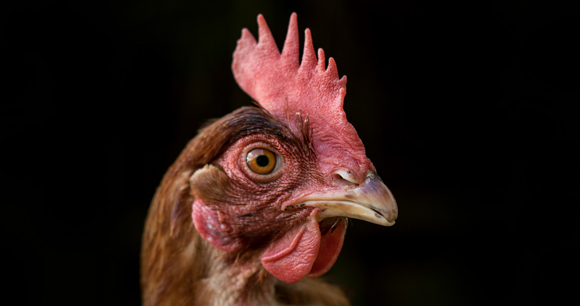
Records show that USDA inspectors only take action in 12% of documented incidents of poultry mistreatment
Washington, DC—The US Department of Agriculture continues to allow birds to be mutilated by machinery, slammed against walls, and buried alive in slaughterhouses without holding the industry accountable, according to a new report released today by the Animal Welfare Institute (AWI).
AWI’s report reviews USDA inspection records from 2020 through 2022 at approximately 350 federally inspected poultry slaughter plants, which process the vast majority of the 9.7 billion chickens, turkeys, ducks, and other birds killed every year for meat.
The Poultry Products Inspection Act (PPIA) governs the slaughter of poultry. However, neither the PPIA nor any other federal law or regulation explicitly requires that individual birds be handled humanely. In 2005, in response to public and congressional outcry over bird mistreatment, the USDA created an oversight program based on “good commercial practices” (GCP). But without meaningful consequences for plants or workers, the program is effectively voluntary.
Over the last 18 years, the department has gradually increased the number of humane handling records issued for noncompliance with GCP at poultry slaughter plants. However, the number of records decreased by more than 40% from a high of 509 in 2018 to only 223 in 2022. And over the last three years, inspectors took actions to prevent the abuse of birds—such as by slowing or stopping the slaughter line—in only 12% of documented incidents. (Under current regulations, inspectors are unable to take enforcement actions for most GCP violations.)
Twenty-one poultry slaughter plants received more than 10 humane handling records from 2020 to 2022, yet the USDA issued only five “letters of concern” (letters sent to plants for serious and repetitive GCP violations). Moreover, two of the five letters were issued to the same plant—Koch Foods of Chattanooga, LLC in Tennessee—and four of the five were issued by the same USDA district office in Jackson, Mississippi. The remaining eight district offices issued no letters at all, according to records obtained by AWI under the Freedom of Information Act. None of the letters were forwarded to local law enforcement to alert them to potential violations of state animal cruelty laws.
“The USDA’s lack of follow-through when confronted with clear evidence of poultry abuse harms both animals and consumers who care about animal welfare,” said Zack Strong, senior attorney and policy advisor for AWI’s farmed animal program. “Until the department enacts meaningful regulations to hold the industry accountable, neither slaughter companies nor their employees have any incentive to treat birds more humanely.”
Between 2020 and 2022, the most commonly cited humane handling problems at poultry slaughter plants involved birds entering scald tanks alive and the improper disposal of other live birds. Violations involving the largest numbers of birds included high dead-on-arrival rates (with hundreds — sometimes thousands — of birds dying during transport and while awaiting slaughter), and mechanical problems resulting in injury or death (such as birds being mutilated after becoming stuck in conveyor belts).
A 2021 undercover investigation of a Foster Farms plant in Livingston, California, revealed on camera many of the same abuses described in USDA inspection records: workers throwing birds to the ground and slamming them against walls, sick and injured birds left to suffer in “condemn barrels” instead of being immediately euthanized, and birds buried alive beneath other birds.
AWI’s recent research, which updates its 2020 report on poultry slaughter, found that the following plants received the most GCP noncompliance records from 2020 to 2022: House of Raeford Farms, Inc., in Rose Hill, NC (33); Koch Foods, LLC, in Chattanooga, TN (30); Perdue Foods, LLC, in Lewiston, NC (29) and Rockingham, NC (28); and Southern Hens, Inc., in Moselle, MS (23). Perdue Foods in Lewiston also received the third-highest number of GCP records (37) between 2017 and 2019.
Slaughter plants and workers who mistreat poultry are rarely held accountable, AWI’s report found. Over the last two decades, various animal protection organizations have publicized at least 40 incidents of poultry mistreatment in slaughter plants; none resulted in animal cruelty charges brought by law enforcement.
Among the report’s recommendations:
- The USDA should promulgate regulations requiring the humane handling of birds by addressing issues such as worker training, transportation and holding conditions, the shackling of birds, and the treatment of sick and injured birds and those entering the scald tank.
- The USDA should refer egregious instances of poultry abuse to local law enforcement officials for investigation and criminal prosecution under state animal cruelty laws.
- The USDA should issue a notice in the Federal Register clarifying that the PPIA and its implementing regulations do not preempt the enforcement of state animal cruelty laws for mistreatment of poultry in slaughter plants.
“The cruel status quo that has persisted in poultry slaughter plants for decades under the USDA’s watch is unacceptable,” said Strong. “Our report outlines steps that the department should take immediately to reduce the suffering of birds and impose meaningful consequences on the perpetrators of such abuse.”
Marjorie Fishman, Animal Welfare Institute
[email protected], (202) 446-2128
The Animal Welfare Institute (awionline.org) is a nonprofit charitable organization founded in 1951 and dedicated to reducing animal suffering caused by people. AWI engages policymakers, scientists, industry, and the public to achieve better treatment of animals everywhere—in the laboratory, on the farm, in commerce, at home, and in the wild. Follow us on Facebook, X (formerly Twitter), and Instagram for updates and other important animal protection news.